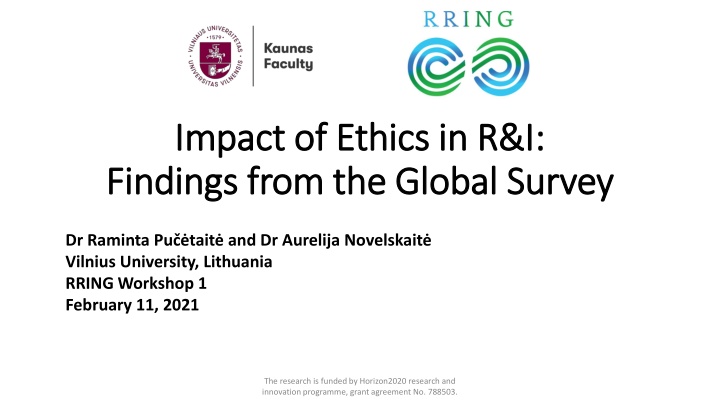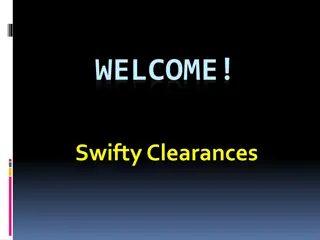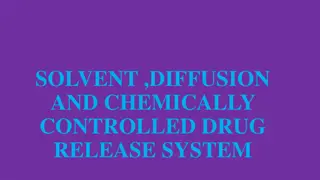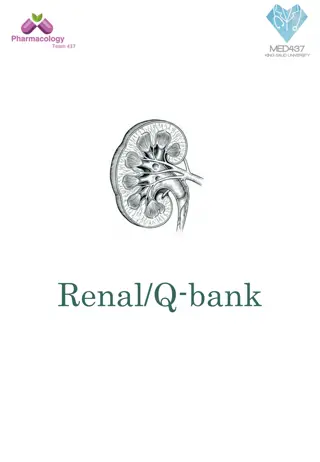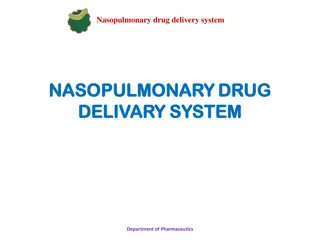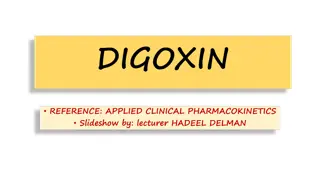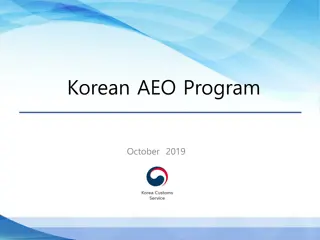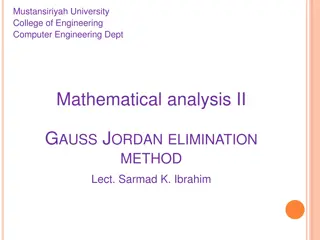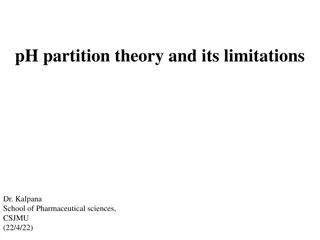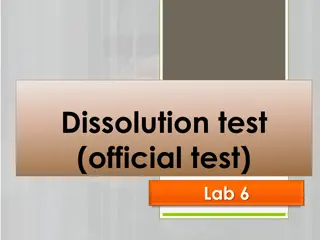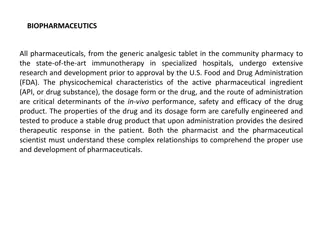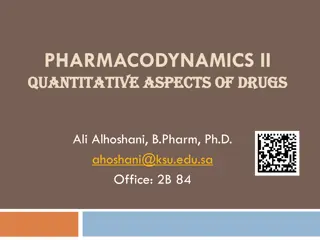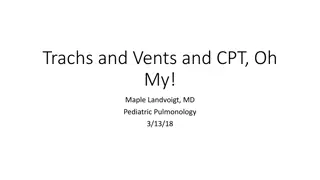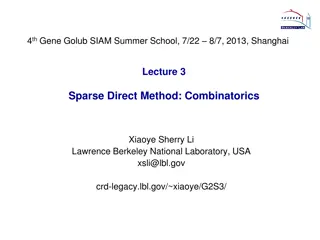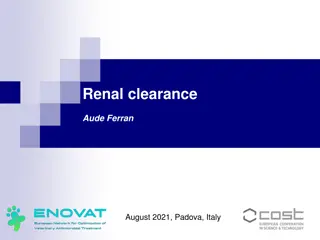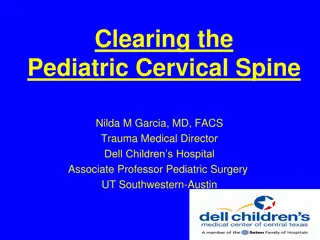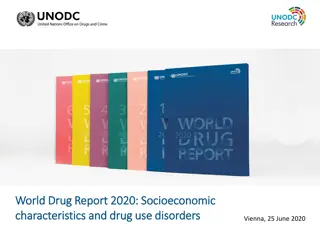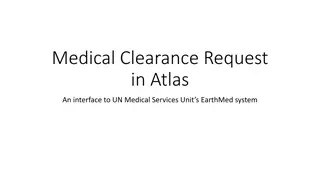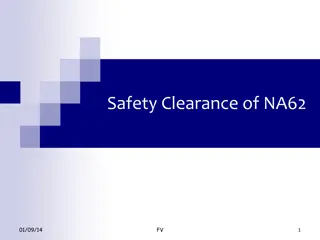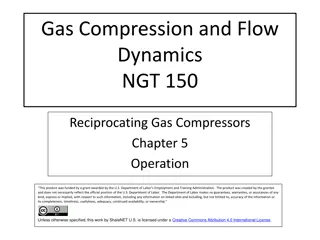Drug Elimination and Clearance: Concepts and Physiology
This comprehensive guide delves into drug elimination and clearance, covering total and body clearances, hepatic and renal clearance, as well as the physiological interpretation and use of clearance in pharmacokinetics. Learn about the definition of clearance, its measurement methods, and its dimension as a flow parameter in mL*min-1 or L*h-1. Gain insights into the underlying principles of drug clearance and its importance in understanding drug metabolism.
Download Presentation

Please find below an Image/Link to download the presentation.
The content on the website is provided AS IS for your information and personal use only. It may not be sold, licensed, or shared on other websites without obtaining consent from the author.If you encounter any issues during the download, it is possible that the publisher has removed the file from their server.
You are allowed to download the files provided on this website for personal or commercial use, subject to the condition that they are used lawfully. All files are the property of their respective owners.
The content on the website is provided AS IS for your information and personal use only. It may not be sold, licensed, or shared on other websites without obtaining consent from the author.
E N D
Presentation Transcript
Impact Impact of Ethics in of Ethics in R R& &I: I: Findings Findings f from rom t the Global Survey he Global Survey Dr Raminta Pu tait and Dr Aurelija Novelskait Vilnius University, Lithuania RRING Workshop 1 February 11, 2021 The research is funded by Horizon2020 research and innovation programme, grant agreement No. 788503.
Aim of the presentation To discuss the findings about the use of ethics and ethical standards in research and innovation. Contribution to the project s WP4 - Global Comparative analysis of status of art Specifically, T4.3 which aims to determine best practice from the 5 UNESCO world regions, 4 key domains (bioeconomy, energy, waste management and ICT) and 5 key stakeholder types (RPO, RFO, CSO, Policy bodies and Industry&Business). The presentation is based on the report for T4.3.5 which focuses on the theme of ethics influenced by both AIRR and RRI key definitions. The research is funded by Horizon2020 research and innovation programme, grant agreement No. 788503.
Objectives of T4.3.5 1. To describe approaches to ethics and practicing of ethics and compare them across the 5 geographies (i.e. 5 UNESCO world regions). 2. To describe approaches to ethics and practicing of ethics and compare them across the 4 key domains. 3. To describe approaches to ethics and practicing of ethics and compare them between different stakeholders. 4. To identify key players, leaders and networks in ethics in RRI discourse and practice and describe their roles. 5. To describe the extent to which RRI policy and practices are linked up globally to drive (or hold back) improvements in ethics. The research is funded by Horizon2020 research and innovation programme, grant agreement No. 788503.
Research ethics: definitions Application of moral rules and professional codes of conduct to the collection, analysis, reporting, and publication of information about research subjects, in particular active acceptance of subjects' right to privacy, confidentiality, and informed consent (A Dictionary of Sociology, 2020, online). The critical study of the moral problems associated with or that arise in the course of pursuing research (Steneck, 2006). Focused on: (1) research integrity: the prevention of unacceptable research and research practices and (2) science and society: the ethical acceptability of scientific and technological developments (Klaassen et al., 2019). The research is funded by Horizon2020 research and innovation programme, grant agreement No. 788503.
Methodological notes: data sets 136 interviews in total 118 semi-structured interviews from WP4 Findings from the WP3 questionnaire Qs: Moving to ethics, what steps do you take to ensure that the way you do your work does not cause concerns for society? Are there any particular protocols, practices, norms or standards you follow in your work to ensure that the work you do is ethically robust, i.e. is it considered as being fair and morally reasonable to everyone involved in the research? 19 semi-structured interviews from WP5 Findings from WP5 questionnaire Qs: What are the main socio-ethical challenges that you face in research and innovation in {AI Identification systems/Gene-editing}? How did these issues come to the attention of the organization? How does your organization respond to such societal issues in research and/or innovation activities? How is the organization affected by them? What approaches do you use in responding to these societal issues? The research is funded by Horizon2020 research and innovation programme, grant agreement No. 788503.
Methodological notes: distribution of interviews ICT: 59 int., 43% Bioeconomy: 50 int., 37% Energy: 50 int., 37% Waste management: 37 int., 27% Europe and North America: 44 int., 32% Arab World: 30 int., 22% Latin America and the Caribbean: 24 int., 18% Sub-Saharan Africa: 22 int., 16% Asian countries: 16 int., 12% RPO: 84 int., 62% CSO: 30 int., 22% Industry: 26 int., 19% Policy: 20 int., 15% RFO: 15 int., 11% The research is funded by Horizon2020 research and innovation programme, grant agreement No. 788503.
Methodological notes: data processing and analysis A theory-driven codebook was used to process the data sets. 610 quotes were coded from the WP3 interviews. 59 quotes from the WP5 interviews. 10% randomly selected quotes from all the WP5 interviews coded by the second coder 4 rounds of ICR testing the final average ICR K-alpha score of 0,926. Thematic analysis, as a process of identifying patterns or themes within qualitative data was performed to examine the perspectives of different research participants, highlighting similarities and differences (Dundalk and Delahunt, 2017) The research is funded by Horizon2020 research and innovation programme, grant agreement No. 788503.
Findings: approaches to ethics and practising of ethics in 5 geographical regions Europe (and more specifically the EU) and North America are more advanced from the perspectives of legal regulations, normative imperatives and ethics management at institutional level. Themes of controversy created by different regulations and expectations, e.g. GDPR and open access, high costs for research when following all the regulations Community pressure for RRI as a theme is dominant in Africa and Arab world. The research is funded by Horizon2020 research and innovation programme, grant agreement No. 788503.
Findings: approaches to ethics and practising of ethics in 4 domains Discourse on ethical regulations is richer in the domains of bioeconomy and ICT (specifically, due to developments of AI). These fields tend to be more strongly legally regulated and operationalized to procedures at institutional level. In the domains of Bioeconomy and Waste management an outlying theme is effect of R&I on society e.g. transparency, open access are not considered as absolutely ethically positive principles/conventions) The research is funded by Horizon2020 research and innovation programme, grant agreement No. 788503.
Findings: approaches to ethics and practising of ethics between 5 stakeholder groups Discourses of stakeholders repeat discourses of the regions. RPOs and CSOs in the sample are similar in their functional operations and are repetitive of the same ethical aspects. Discourses from RFOs and Policy bodies on some categories of the codebook are absent or very few. Therefore, comparison between all the stakeholder groups is challenging. The research is funded by Horizon2020 research and innovation programme, grant agreement No. 788503.
Findings: key players, leaders and networks in ethics in RRI discourse and practice and their roles Global scope: World Resources Institute (WRI), Global Reporting Initiative (GRI), Association for Computing Machinery (ACM), Ethical, Legal and Social Implications (ELSI, in the USA) or Aspects (ELSA, in Europe), the Food and Drug Administration (FDA), European Medicines Agency (EMA) as well as Kyoto protocol, Paris agreement, Stockholm convention, and, in general, UN SDGs and EC regulations. Some countries (e.g. in African region) still are on the way to adapting the regulations. National level: the ethics discourse is embedded in national legislation and maintained by governmental bodies (ministries, boards, committees, funding organizations, national programs, etc.) of the national states. Governmental bodies may be incapable or incompetent and impede development of R&I to some extent in particular countries. Alliances of communities of practice contribute to developing / strengthening the discourse at national level. The research is funded by Horizon2020 research and innovation programme, grant agreement No. 788503.
Findings: key players, leaders and networks in ethics in RRI discourse and practice and their roles 2 Organizational level: ethics committees and commissions, institutional review boards as well as sustainability teams, corporate responsibility teams, ethics departments sustain and maintain the ethics discourse. R&I organizations (with some exceptions) do not contribute to creating and developing the RRI discourse. Individual level: obedience to the prevailing discourse, which is transmitted by internal rules of R&I organizations or standard norms of communities of practice. A theme of doubt about relevance of formally embedded ethics discourse suggests the need to consider approaches prevailing in wider societal establishments. The research is funded by Horizon2020 research and innovation programme, grant agreement No. 788503.
Findings: role of RRI policy and practices in improvements of ethics The ethics developments proclaimed by such global / regional establishments as UNESCO or EC are implemented into national policies to different levels and operate with different intensity in particular countries and, apparently, in different regions. There is global linkage and works towards unification of ethical standards and strengthening ethical practices in R&I activities globally. The research is funded by Horizon2020 research and innovation programme, grant agreement No. 788503.
Limitations The analysis was based on interview materials, but not policy documents. The focus of this analysis did not include RRI policies and (political) practices, but ethics in the R&I. Estimation of the extent to which RRI policy and practices affect ethics cannot be accomplished with qualitative data, i.e. fragmented references to political positions and political documents in the interviews do not provide background for a reliable definition of political coverage neither in any particular region nor in particular domain. Due to absence of systemic elaborations on ethical practices during the interviews, the analysed data do not provide enough information for reliable comparisons and generalizations. The research is funded by Horizon2020 research and innovation programme, grant agreement No. 788503.
References Dundalk, M.M., Delahunt, B. (2017). Doing a thematic analysis: A practical, step-by-step guide for learning and teaching scholars. AISHE-J 9(3): 3351- 33514, http://ojs.aishe.org/index.php/aishe-j/article/view/335, p. 3352. Klaassen, P., Kupper, F., Rijnen, M., Vermeulen, S., Broerse, J. (2019). D1.1. Policy brief on the state of the art on RRI and a working definition of RRI. Athen Institute, VU University of Amsterdam. RRITools, p. 6. Research ethics. A Dictionary of Sociology. Retrieved December 21, 2020 from Encyclopedia.com: https://www.encyclopedia.com/social- sciences/dictionaries-thesauruses-pictures-and-press-releases/research- ethics. Steneck, N.H. (2006). Fostering Integrity in Research: Definitions, Current Knowledge, and Future Directions. Science and Engineering Ethics, 12(1), 53-74. DOI: 10.1007/s11948-006-0006-y. The research is funded by Horizon2020 research and innovation programme, grant agreement No. 788503.
